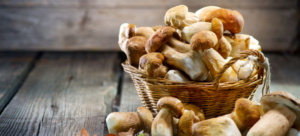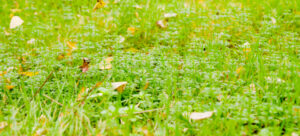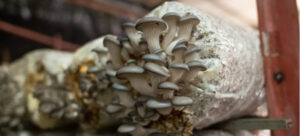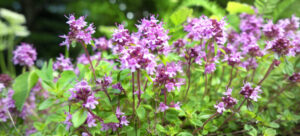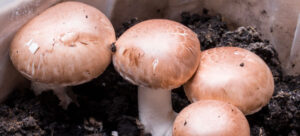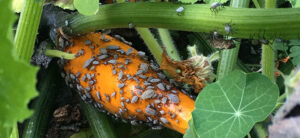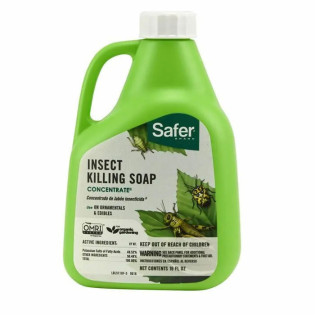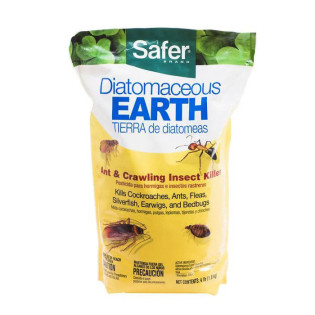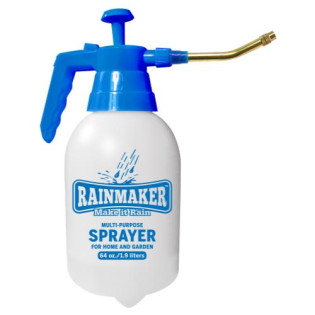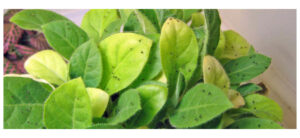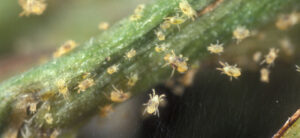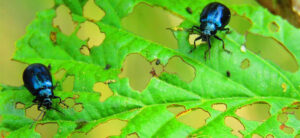
Learning how to get rid of squash bugs naturally in the garden is an important task. This is true for anyone growing veggies from the squash family.
These pests are primarily found on these families of plants. Just about any garden can develop an outbreak of these frustrating bugs though.
Often confused for stink bugs, squash bugs are unfortunately far more detrimental to plants. Both have a nasty odor when crushed and are quite similar in appearance.
Fortunately, there are several steps you can take when it comes to getting rid of squash bugs in the garden. We'll cover these in depth and help you weigh your options.
We first need to explain what type of damage these bugs can do if left to do their bidding. We should also look at how to identify them. We also want to share a few prevention tactics. These might save your garden and plants from ever experiencing an infestation in the first place.
For squash bugs control it's important to take preventative measures. You can use row covers to protect your plants or rotate your crops to avoid infestations. You can also handpick and remove squash bugs and their eggs.
You can also use insect soaps or neem oil to control squash bugs. Additionally, planting trap crops like radishes or marigolds can help lure squash bugs away from your main crops.
What Are Squash Bugs?
These pests are relatively easy to identify. So there is some good news at the very least.
Adult squash bugs are flat, brown or gray insects that are about ⅝ inch long. They have long legs and antennae, and their wings are held flat on their backs.

Because of their size, you should be able to see these bugs with the naked eye.
They feed on the sap of plants, which can cause wilting and stunted growth.
Squash bugs look similar at all stages of their life cycle, but young bugs are usually gray with black legs.
They move rapidly as they feast upon your plants. Just one squash bug egg cluster can yield 12 or more larvae. As they emerge, they’re starving, wanting nothing more than to munch upon your unsuspecting plants.
Squash bugs will overwinter in the garden, hiding in dead leaves, buildings, and under bits of wood.
They’ll fly to your plants to mate as soon as they start producing vines. Adults will lay their eggs on the bellies of leaves in clusters. This is when the real trouble starts! The freshly hatched nymphs can do significant damage.
What Damage Can Squash Bugs Do In The Garden?
Squash bugs damage can be serious for you plants. The good news is that the damage is usually treatable.
These pests inject toxins into your plant, sucking the sap of their favorite squash plants and leaving behind yellow spots.

These spots eventually turn brown and spread. This will cause your leaves to wilt as nutrients can’t flow to leaves as they should. This can cause wilting, yellowing, and stunted growth. They can even spread and transmit plant diseases.
After that, leaves tend to dry up and turn black and brittle. Some leaves may even look ragged and holey in appearance.
Unfortunately, small squash plants usually die. Larger, more established plants may be able to survive a squash bug infestation. As long as you take steps to remedy it sooner rather than later you improve your chances.
The real challenge posed by squash bugs is that the symptoms are not quite so easy to pinpoint. Even though the pests are easy to identify.
Gardeners often confuse squash bug infestations for bacterial wilt, a disease that tends to be spread by cucumber beetles.
Therefore, it’s important that you act fast if you suspect a squash bug infestation. This will make sure what pest is plaguing your plants as well as to treat it with haste.
How To Prevent A Squash Bug Infestation In The First Place
Early detection and prevention are crucial when it comes to preventing squash bug infestations.
Proper Watering & Feeding Goes A Long Way
Though it may seem obvious, general garden care principles apply. That means you should do your best to provide even, consistent watering and regular fertilizer for your plants.
This will help your plants stay strong so they can fend off a squash bug infestation if it does occur.
Clean The Garden & Eliminate Overwintering Sites

In addition it’s a good idea to burn or compost old plants in your garden. Especially at the end of each growing season.
This will eliminate potential sites where bugs might breed or overwinter. Rotate your crops each year to stave off localization. Avoid growing any plants in the cucurbit family in the same spot two years in a row. You may want to avoid deep mulches like hay or straw.
Mulch is a great idea when it comes to preventing weeds and moderating soil moisture. The problem is these cool mulches can serve as breeding grounds for these pests.
Plant Nasturtium As A Companion Plant
Companion planting is another technique that may help you prevent a squash bug infestation.
Consider growing plants like nasturtium around your squash, melon, or cucumber plants.
Keep your vines covered until they blossom. This can help you avoid the only generation of squash bugs that will appear early in the spring.
Consider Planting More Resistant Squash Varieties
Finally, try planting squash varieties that are resistant to infestation. Some good options include ‘Sweet Cheese,’ ‘Royal Acorn,’ and ‘Butternut.’
Most early summer crookneck squash varieties are also resistant to squash bugs.
Planting transplants rather than seeds is also a good idea, as this will help protect plants when they are at their most vulnerable.
How To Get Rid Of Squash Bugs In The Garden Naturally
Getting rid of squash bugs in the garden can be a big task. You’ll want to remember that early detection is essential to control squash bugs.
Killing squash bug larvae and eggs before they grow into adults can help you prevent a larger infestation later on.
There are a few other options, too, most of which have to do with checking your plants regularly for squash bugs.
Physically Remove & Destroy Squash Bugs & Larvae From Your Plants

Check your pants every day, collecting and destroying any bugs or egg clusters that you find. Some people simply crush these, while others drop them into buckets filled with water and liquid dish soap.
Another way you can search for squash bugs is to put a board in the garden at night. The bugs will gather beneath the board during the night. You can then dispose of large amounts of bugs all at once.
If you’re worried about squash bugs affecting your plants, consider laying row covers over them. You should remove the row covers when your plants start to blossom. If done correctly, row covers can do a good job of reducing the potential for a problem.
Spray Neem Oil To Kill Squash Bugs On Plants

Another option for getting rid of squash bugs naturally is to use neem oil. Derived from the Indian neem tree, this powerful fungicide and insecticide can be used against most common garden pests.
Neem oil is an organic plant-based insecticide. It works by disrupting the feeding and reproductive behaviors of pests like squash bugs. Because of it’s strong, bitter taste it also works as a repellent.
When larvae are exposed it can also disrupt growth regulators, inhibiting molting and maturing.
Some insects that are affected by this are Japanese beetles, stink bugs, and of course, squash bugs. A great thing about this product is that it won't harm beneficial insects, such as pollinators.
We have a complete guide on when and how to use neem oil on your plants. Go ahead and check it out if this is an approach you're interested in learning more about!
Diatomaceous Earth Can Kill Squash Bugs

Diatomaceous earth is another option. This powder is made from ground-up diatoms, or fossilized sea creatures, and applied as a powder near plants.
When this is applied to squash bug infested areas, it dehydrates the bug. The powder causes insects to dry out and die. It acts by absorbing the oils and fats from the cuticle of the insect's exoskeleton.
It’s safe for pets, people, and wildlife. All while the microscopic shards cut into the soft bodies of insects like squash bug larvae.
And, as it turns out, we have another complete guide on how to use diatomaceous earth in the garden!
Bring Beneficial Insects To The Battle
You might even try some natural predators! Chickens and guinea hens both love munching on squash bugs, as do adult tachinid flies.
There are several beneficial insects that can help control squash bugs:
- Tachinid flies: These parasitic flies lay their eggs on squash bug adults. When the eggs hatch, the larvae feed on the squash bug. This will eventually kill it.
- Assassin bugs: These predatory insects feed on a variety of pests, including squash bugs.
- Ladybugs: These beetles are well-known predators of aphids, but they also feed on other soft-bodied insects like squash bugs.
- Praying mantis: These predatory insects can consume a wide range of pests, including squash bugs.
- Lacewings: These insects are also known as "aphid lions". That is because their larvae feed voraciously on aphids and other soft-bodied insects like squash bugs.
- Nematodes: These are microscopic, parasitic worms that attack the larvae and pupae of many insects, including squash bugs.
Our complete guide on beneficial bugs will help you understand which insects to use for which plants.
You can also check out our full line up of beneficial insects here!
It's important to note that while these beneficial insects are excellent in helping control squash bugs. They may not completely eliminate the pest population on their own though.
It's still a necessity to employ other pest management strategies, such as removing plant debris, using row covers, and rotating crops.
What Pesticide Kills Squash Bugs In The Garden?

There are several pesticides you can turn to if the natural methods above don’t cut it. The most common pesticides used to kill squash bugs include pyrethrin as an active ingredient. Here are a few to consider:
- Bonide Pyrethrin Garden Insect Spray Concentrate - potent concentrate, dilute with water prior to spraying.
- Fox Farm "Don't Bug Me" Pyrethrin Spray - Pre-mixed, ready to use spray bottle.
Keep in mind, spraying your insecticides at the right time is just as important as choosing the right one. For best results, these need to be applied when eggs are hatching.
It’s a good idea to check in with your local cooperative extension. They can help you to find out what is recommended in your area before you decide to apply anything.
Final Thoughts On How To Get Rid Of Squash Bugs In The Garden Naturally
You probably landed here wondering “how do you get rid of squash bugs”? Hopefully this article cleared up some confusion for you and answered some questions.
When you pride yourself on growing prize-winning pumpkins and mouth-watering zucchinis, you no doubt want to get rid of pest problems as quickly as possible.
By following these tips you’ll be well on your way to a bountiful harvest. You can also achieve a pest-free garden as well! Reach your dream garden goals by shopping for all your pest control needs at Hydrobuilder.
